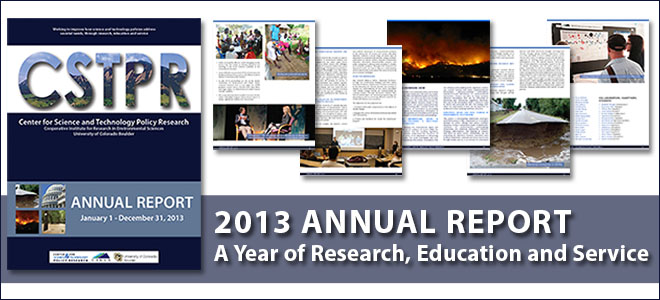Center for Science and Technology Policy Research Annual Report
January 1 – December 31, 2013
2013 report [pdf]
Working to improve how science and technology policies address societal needs, through research, education and service
The Center for Science and Technology Policy Research (CSTPR) was established within CIRES in 2001 to conduct research, education, and outreach at the interface of science, technology, and the needs of decision makers in public and private settings. The Center focuses considerable attention on the intersection of the environment and society, where it applies the social and policy sciences to problems of environmental change, management, and sustainability. The Center’s research is integrated with the ongoing activities of CIRES, NOAA, CU-Boulder, and the broader science and technology community.
Letter from the Director
During the summer of 2014, as this annual report was being finalized, I had a chance to organize a dinner with some of the alums of the CIRES Center for Science and Technology Policy Research. The former students, now friends and colleagues, come from a remarkably diverse array of professions. These alums today work for the United Nations, a major research university, an international energy consulting firm, and a leading science association, among other places. It is an impressive bunch.
More than anything else, these former students exemplify the sharp focus on science, technology and decision making that we hold as our mission at CSTPR. Doing research that makes a difference requires engagement, always as an orientation and often as a calling. Over the past 12 years, CSTPR has focused on research, education and outreach where science, technology and decisions collide, with notable achievements.
So it was with great enthusiasm that I agreed to serve another term as Center director, starting in late 2013, succeeding Professor William Travis. At our summer dinner one of my former students asked about the Center’s secret for developing such successful alums. My answer was to pick people destined to succeed and get out of their way. It’s a good philosophy for directing this Center as well.
In 2013, the Center’s faculty and staff had some notable achievements. You can read all about them in this annual report. I do want to highlight two of our most innovative efforts, and ones that we hope to build upon in coming years:
The Red Cross/Red Crescent Climate Centre Internship Program, led by Max Boykoff and Meaghan Daly, seeks to improve climate change communication and adaptation decision-making in response to climate variability and change within the humanitarian sector. The program placed its first interns in Kenya, Uganda and Zambia during the summer of 2013. We hope to further institutionalize this program in the coming years.
The Graduate Certificate in Science and Technology Policy, now in its ninth year, is a rigorous educational program to prepare students pursuing graduate degrees for careers at the interface of science, technology, and decision making. The program currently includes 22 students from a variety of CU departments and institutes. Twenty-three students have received certificates from the program and have found careers in government, academia and nonprofits. We are in the earlier stages of discussions about turning this certificate into a degree-granting program.
As the Center moves well into its second decade we look forward to building upon the notable successes of the past, but also breaking new ground. Watch this space – it will be an exciting time to come.
Roger Pielke, Jr.
Director
pielke@colorado.edu


